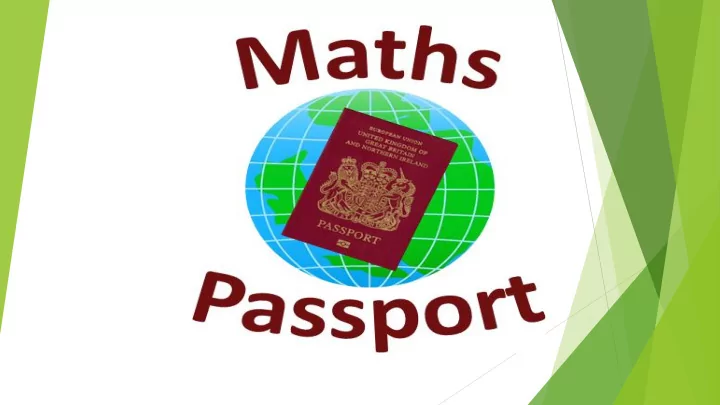

Every child has been given a passport for the different continents of the world.
Each passport has a series of steps based on recall of mental maths number facts. These steps are taken from the current National Curriculum and are the key skills that children need to know.
In a Reception class, this could be counting to 20 or saying what is 1 less than any number between 0 and 20.
In a Year 2 class, this could be knowing all multiplication facts for the 10 times table.
In Year 5, this could involve being able to multiply whole numbers by 10, 100 and 1000.
What do the children have to do? Each child needs to work towards the steps on their passport and demonstrate on three separate occasions that they are able to meet them in a timed session.
Passports will have a high profile around the school Passport displays are up in classrooms and corridors to show where each child is travelling. Successes will be celebrated in assembly and in class.
How you can help: • The most important thing for you to do is to TALK and LISTEN to your child each day about what they know about their Maths Passport Targets. • Ask your child to show you something they have learned or are practising in Maths that supports their target work. • We would like you to spend a few minutes each evening practising your child's passport skills with them. This could be in the car, at teatime, in the bath, before bed... anytime! • It does not need to be a formal, sit down session.
There are also a range of online computer games that support the development of recall skills. • www.topmarks.co.uk • http://mathszone.co.uk • www.bbc.co.uk/education Plus IXL.
Recall is the key! • At first, it may seem that the work they are doing is too easy, but they should not be taking time to work out the answer to each question – they need to know it instantly. We want to improve the speed at which children recall each number fact from memory.
Where should your child be up to on Maths Passports? The new National Curriculum is heavily focused on all children meeting “Year group expectations.” Below is a guide of roughly where your child should be on the Passport scheme to be meeting these expectations. If your child is below where they should be, it may be that they need more practice on their Passport targets.
There are additional Passports for Year 6 and beyond, however the focus is on consolidation of skills and knowledge while preparing for SATS tests.
On the school website you will find: • Guidelines to all the Maths Passports • Copies of the school Calculation Policies • “I Can Statements” showing what will be covered in each year group. • Advice on how to help your child at home with Maths.
Recommend
More recommend